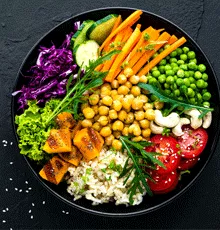Going vegan. Is it truly a healthier way to get the nutrients your body needs? If this is something you’re thinking about, or perhaps you’re already living the vegan lifestyle, here’s what you need to know to make sure you’re giving your body all the fuel it needs.
What is vegan?
A vegan diet is a type of vegetarian diet that excludes not just meat, but ALL animal products including dairy and eggs.
What’s the difference between being vegan + a vegetarian?
A vegetarian diet is a plant-based diet that excludes meat, but may still include animal products such as dairy, eggs and or fish. Variations of the vegetarian diet include:
- Pescatarian: those who avoid meat and poultry but still eat fish and seafood
- Lacto-ovo vegetarian: those you skip all meat, fish and poultry but include dairy and eggs
Is vegan a healthy lifestyle?
Vegan diets can be a part of a healthy lifestyle when planned and implemented correctly. Like any eating plan to restrict specific food groups, vegan diets can come up short in essential nutrients such as protein, calcium, iron and vitamin B12. If planned and supplemented (as needed) appropriately, vegan diets can certainly be a part of a healthy lifestyle. However, you do not need to be on a vegan diet to be living a healthy lifestyle.

Would you consider it a healthier diet than one that incorporates meat/animal products?
I would not consider a vegan diet a healthier diet that those that incorporate meat and animal products. As a general rule of thumb, a healthy diet should be one that is robust in a colorful variety of plant-based foods, including fresh vegetables, fruits, legumes, nuts/seeds & whole grains. By prioritizing plant-based foods in your meals, there is certainly space to incorporate meat/animal products while maintaining the benefits of those plant-based foods. I would suggest choosing lean proteins such as skinless poultry, fish and seafood and incorporating a meat-free meal on occasion. Limiting highly processed meats or meat alternatives on either diet is an important key to optimizing health benefits for any diet.
Are there things people should do (supplements they should take) to ensure they're getting enough nutrients?
I would recommend that people stay aware of important nutrients known to be low on a vegan diet, including protein, calcium, iron and B12. A number of products are fortified with essential nutrients including:
- Calcium: fortified milk alternatives (soy milk, rice, milk, almond milk, etc.), fortified orange juice, tofu with added calcium; broccoli, beans, leafy greens, almonds, almond butter, sesame seeds and soybeans all have naturally occurring calcium
- Iron: soy nuts, tofu, kale, spinach, beans, peanut butter
- Protein: lentils, beans, quinoa, oatmeal, buckwheat, hemp seeds, tofu, whole grains, nuts & nut butters
- B12: Fortified soy milk or orange juice, fortified cereals, nutritional yeast
Note: B12 is the most challenging nutrient to achieve optimal intakes and typically requires oral supplementation.
Working with a registered dietitian will be your best opportunity to optimize the balance of your diet and identify areas where additional supplementation is needed.
Is there anyone who should NOT be vegan?
Growing children should not be on a vegan diet due to lack of essential vitamins, minerals and proteins needed for these growing bodies.
Other individual considerations should be discussed with your health professional before starting a diet or lifestyle change. In general, women who are pregnant or breastfeeding should meet with a registered dietitian to optimize nutritional intake during this important time of growth and development to ensure adequate nutritional delivery.
Another important note:
Any diet and lifestyle change should be discussed with your health professional. Talking with a registered dietitian may be an important opportunity to discuss the goals of your diet and lifestyle and help determine the appropriate eating plan for you. Remember, a vegan diet is not inherently healthy- what we can take away is that incorporating a robust variety of plant-based foods into the diet while avoiding processed foods and processed meats is the key to optimizing health benefits- whether or not you choose to eat meat.
The above content is provided for educational purposes by Tufts Medical Center. It is free for educational use. For information about your own health, contact your physician.
